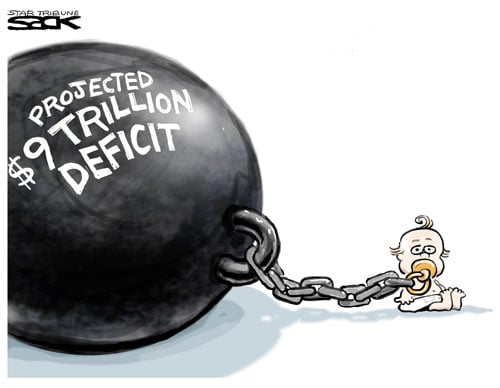
Source: Google Images
A central challenge of our times: America, Europe, and countries the world over will have to figure out a way to staunch the hemorraging red ink we are currently sustaining. As a result of fiscal stimulus packages and bank bailouts, in addition to the standard generous provision of guns and butter, we will be talking a lot more about fiscal policy in the years to come. The Economist produced three nice, analytically meaty articles on the subject in its Nov. 21-27 edition — not yet emailed to me electronically, but I will post them in this blog when available.
In the 1980s, in a moment of candor, Reagan’s Director of the Office of Management and Budget, David Stockman, said that the intent of the Reagan administration was to cut taxes so that deficits got so big that the government would be forced to cut spending so dear to liberals. That was Reaganomics, smash liberalism not directly through spending cuts, but through tax cuts. Publicly, however, we were sold some snake oil called Supply-side economics that purported to yield a higher tax intake because tax cuts would spur growth. We would grow our way out of Reagain’s gaping deficits. Not so. George H.W. Bush had to raise taxes during his term, which arguably cost him re-election, the two-term Gipper safely back on his ranch in California.
Is Obamanomics the reverse? We’re told that health care reform will yield cost containment, which will ensure that government spending on health care will not grow dramatically. Many doubt the current packages in Congress will do that. So, in effect, Obamanomics argues that by raising spending, we will reduce deficits through cost containment. Reaganomics in reverse? H.W. called this Voodoo Economics before he became the Gipper’s VP.
In any event, have a read of the Economists articles. The Economist briefing on America’s fiscal deficit argues that in addition to spending restraint — including later retirement ages for baby-boomers and winding down soon our two wars in Iraq and Afghanistan — tax hikes will be needed. The article recommends tax reform, which will either close income tax loopholes favoring the rich and impose carbon taxes, or launch a Federal value-added tax, such as all other OECD countries have. These decisions will be politically agonizing because they affect both economic efficiency and fairness. The VAT discourages consumption, which we need to do, but is regressive, affecting the poor more than the rich. Our current reliance on an income tax that has more holes in it than Swiss cheese — for wealthy mice to scamper through — provides disincentives to growth. More importantly, if we don’t take these decisions — to raise taxes and cut spending, the Economist argues, the bond markets will punish us with higher interest rates and the rating agencies with a loss of our AAA credit rating.
Get used to it: fiscal policy will become a critical kitchen-table issue in the years to come…